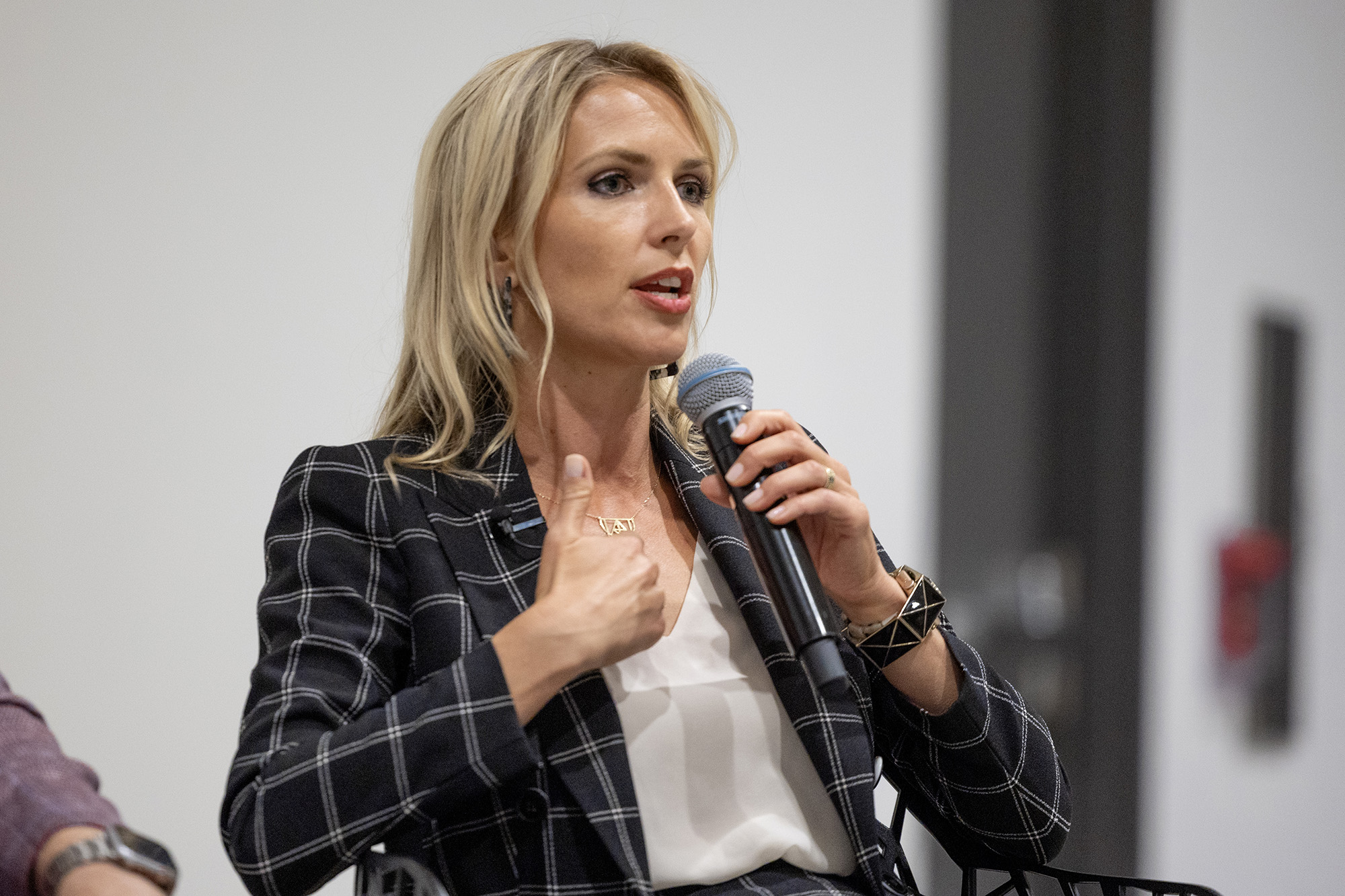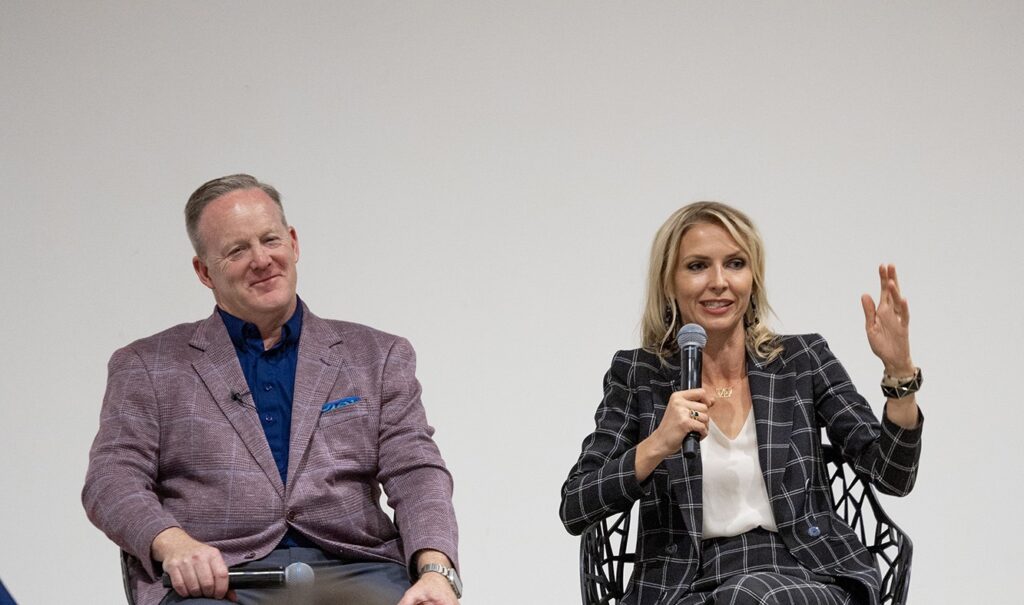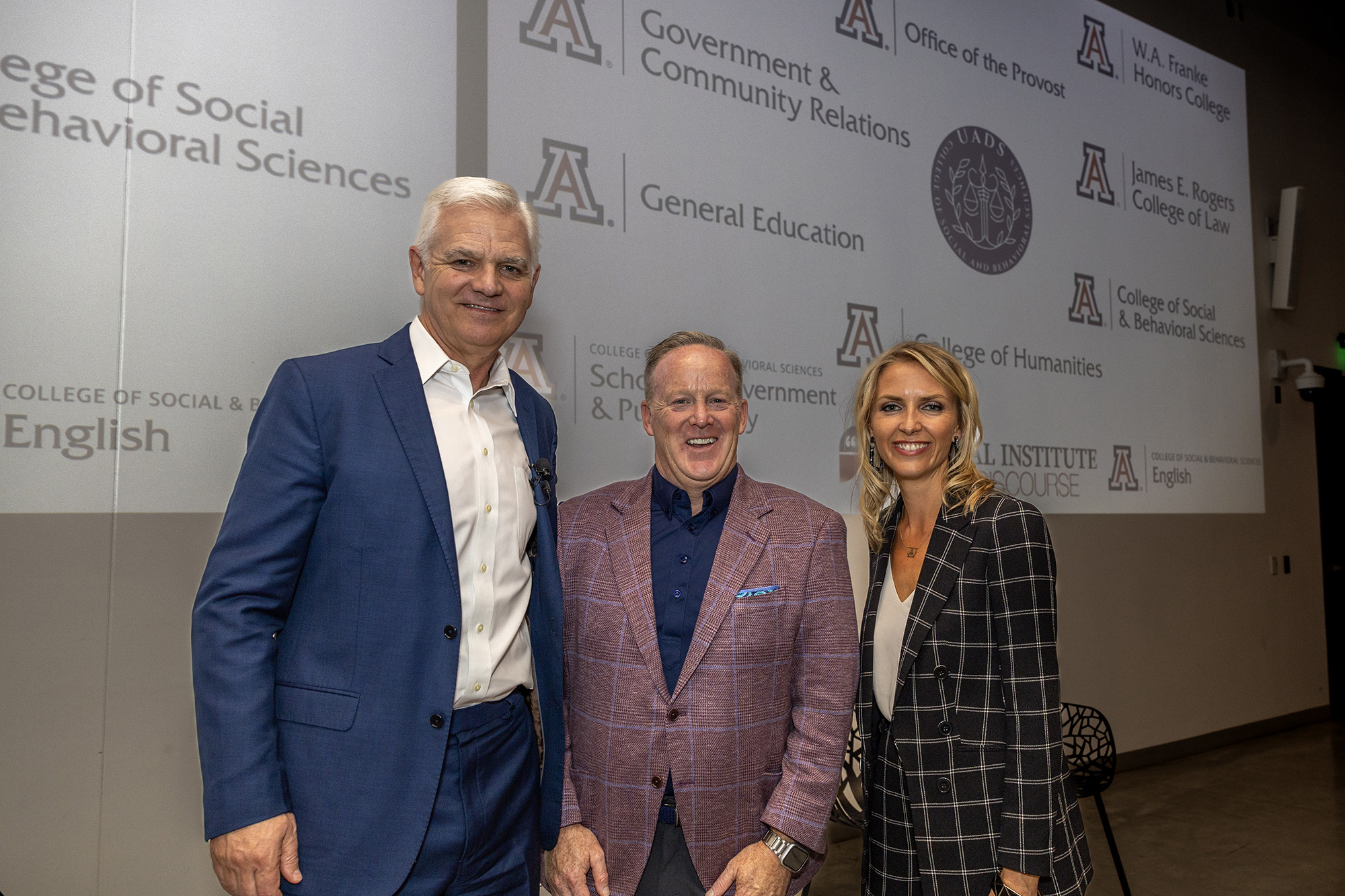UNIVERSITY OF ARIZONA, TUCSON, ARIZONA Showcasing the power of civil discourse, former press aides from the Obama and Trump administrations came together at the University of Arizona to demonstrate that political differences need not prevent meaningful conversation. The October 24, 2024 event, which drew over 100 students, faculty, and community members, featured Johanna Maska, former press aide to President Obama, and Sean Spicer, former Trump Administration press secretary, in a candid discussion about America’s political landscape.
The event, “Bridging America’s Political Divide in an Election Year,” was hosted jointly by the UA Freedom Center, UA Discourse Series, and the National Institute for Civil Discourse.
Prior to the main event, Maska engaged with UA students to understand their perspectives on current politics and the upcoming election. Several students expressed concerns about the challenges of finding reliable and accurate information. Payton Hussman, a senior at UA, emphasized the importance of healthy dialogue. “That’s how democracy fails — when people aren’t willing to listen. You don’t even have to change your mind, just a willingness to listen … And I feel like right now, depending on how crazy things get, we might realistically be on a path where that’s not an option for America anymore.” You can read Maska’s post here.

Keith Allred, Executive Director of the National Institute for Civil Discourse, moderated the 90-minute discussion, which revealed surprising areas of agreement between the former administration officials. Both speakers emphasized the importance of looking beyond party lines to address national challenges.
“I would like to see Republicans and Democrats work together. I believe that we have more things in common than we have differences. To change Washington, we have to change our culture,” Maska noted, citing specific examples of bipartisan collaboration during her time in the Obama administration.
Spicer commended the University for events like this. “It’s important to me that students come together in these venues and bring voices together. We often don’t hear the other side and then don’t acknowledge it.”
Both speakers addressed the media’s influence on political polarization, finding common ground in their critique while offering nuanced perspectives. Spicer cautioned against broad generalizations about “the media,” noting the distinction between responsible journalism and sensationalized reporting. Maska highlighted that the media plays a significant role in perpetuating divisiveness by amplifying polarization.

Keith Allred ensured the discussion offered practical strategies for fostering respectful conversations. These included:
Disagreeing with Respect and Civility: Spicer noted that the ability to consider and respect differing viewpoints is essential for healthy dialogue. Maska noted the importance of not using de-humanizing language.
The Importance of Asking Questions: Spicer highlighted the value of curiosity and inquiry in fostering productive dialogue. He encouraged students to ask questions, even about sensitive topics, as a way to better understand different perspectives and challenge their own assumptions.
Engage in Active Listening: Maska emphasized the need to truly listen to understand the other person’s viewpoint rather than just waiting for your turn to speak. She stressed that this involves paying attention, asking clarifying questions, and attempting to see the issue from their perspective.
Be Willing to Change Your Mind: Both speakers acknowledged the importance of being open to changing one’s mind based on new information or insights gained through dialogue. This underscores the value of intellectual humility and a willingness to consider alternative perspectives.
Recognizing Areas of Agreement: Despite their different political backgrounds, Maska and Spicer agreed that there is often more common ground than people realize. They suggested that focusing on shared values and goals can help create a more collaborative atmosphere.
The Value of Disagreement: Maska and Spicer underscored that disagreement, when approached constructively, can be a powerful tool for learning and growth. They argued that diverse viewpoints and robust debate can lead to better solutions and a deeper understanding of complex issues.
Both speakers expressed hope for the future of American politics. Maska found encouragement in the younger generation’s willingness to engage in meaningful conversations across political differences. Spicer expressed hope in the very act of engaging in dialogue, stating, “the fact that we can still sit here today and have this conversation” offers a path towards greater understanding and cooperation.
The conversation underscored the Freedom Center’s ongoing commitment to fostering constructive dialogue and promoting the values of freedom and democracy. Freedom Center Director Dr. Mary Rigdon observed, “One of the main talking points throughout the conversation between Sean Spicer and Johanna Maska was the importance of having a conversation with those who hold an opposing viewpoint and most importantly to listen to each other. Despite being on two different sides of the political spectrum, Spicer and Maska strongly agreed on this. They urged the people in attendance to engage in civil discourse as a way to bridge the political divide.”
The UA Discourse Series is dedicated to elevating public discourse through respectful, rhetorically-sound, and competitive – at times voracious – debate. While last night’s dialogue may have not reached the level of “competitive” or “voracious”, it served as a compelling example of civil disagreement in action. UA Discourse Series director Ted McLoof emphasized this. “Sean, Johanna, and Keith led by example in extinguishing inflammatory rhetoric through productive, nuanced discussion. The panel was not only bipartisan but nonpartisan, eschewing the usual right-left spectrum in favor of what we have in common. And our audience of engaged, thoughtful students rounded out a fantastic evening.”
The Freedom Center, the UA Discourse Series, and the National Institute for Civil Discourse provide opportunities for engagement with diverse viewpoints. This event exemplifies that commitment, creating a space for thoughtful consideration of various perspectives and promoting a better understanding of the complexities involved in bridging political divides in America.
The Freedom Center, as part of its mission to enrich the university community by encouraging engagement with diverse perspectives, will continue to host events that address important societal issues. See all Freedom Center events here and the UA Discourse Series events here. View KGUN9 news coverage here.

# # #
About the University of Arizona Center for Philosophy of Freedom
The Freedom Center was founded in 2008 and is today a University Center in the Office for Research, Innovation & Impact. It provides research, teaching, and programming that is grounded in individual freedom and honors people’s right to constructively disagree.
Our faculty draws from philosophy, politics, economics, law, and ethics to enhance our understanding of the elements that shape individual and societal prosperity. Center scholars also include post-doctoral fellows, Ph.D. students in philosophy, and visiting and research fellows we host from universities worldwide.
The Center’s impact comes through research, publications, graduate education, academic programs, and major community events. In all we do, we are committed to integrating multiple disciplinary perspectives, training critical thinkers, and fostering constructive public debate.
For more information: https://freedomcenter.arizona.edu/ (Follow us: X | Instagram | LinkedIn).
About the UA Discourse Series
The UA Discourse Series is a series of public forums dedicated to elevating our national discourse. Each semester, campus faculty, public officials, community leaders, and students engage in a series of roundtable discussions on matters of public interest. Members of the University and greater Tucson community are welcome to attend our forums, ask pointed questions, and vote on the winners!
For more information: https://sbs.arizona.edu/ua-discourse-series (Follow us: X | Instagram).
About the National Institute for Civil Discourse
The National Institute for Civil Discourse (NICD) at the University of Arizona was created in 2011 following the Tucson shooting that injured Congresswoman Gabrielle Giffords. Though the shooting spurred its formation, Giffords had already been in talks with the university to establish a center focused on improving civil discourse. NICD is a non-partisan organization dedicated to fostering healthy political debate, built on the belief that people with differing views can have productive conversations. NICD’s strategy involves inspiring the American public and encouraging political leaders to prioritize the country over partisanship, positioning the institute as a leader in promoting respectful, civil discourse.
For more information: https://nicd.arizona.edu/ (Follow us: X | Instagram).

